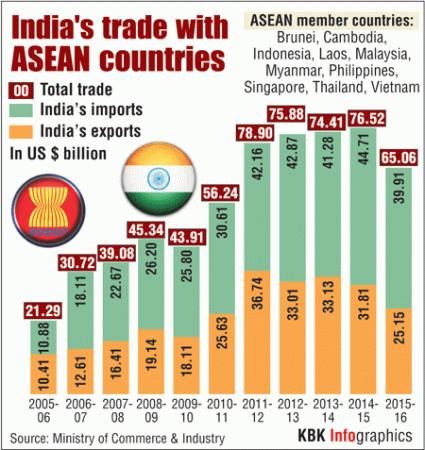
India pledged its support for the realisation of a balanced Regional Comprehensive Economic Partnership Agreement at the Association of Southeast Asian Nations (ASEAN) 2016 summit held in Vientiane, the capital of Laos. However, apex trade association Assocham doubts the utility and efficacy of ASEAN trade pacts from India's perspective.
India's exports to ASEAN have stagnated at $25 billion since the start of the free trade agreement (FTA) with the 10-nation bloc from January 2010, while imports rose by over 33 percent to $40 billion, according to a report released on Sept. 1.
Since the implementation of the FTA, India's total exports to the South East Asian region for the period between 2010-11 and 2015-16 also dropped to 9.6 percent from 10.3 percent. Though the lack of growth in exports to ASEAN could be chalked up to the global economic slowdown, the same cannot be said about imports.
"The impact on increased imports may be even more pronounced on conclusion of the current financial year since tariff is to be eliminated on as many more items as 800 under 1252 tariff lines. Tariff would have already been eliminated on 3,200 products under the Normal Track 1," the paper highlighted.
The paper goes on to add that overall FTA for India-ASEAN comprises of two parts – goods and services. The agreement on goods was front-loaded, while services pact was back-loaded.
In goods, India's average rate in agriculture is more than 34 percent against 13 percent in ASEAN. Similarly, India's average most favoured nation (MFN) tariffs for manufacturing goods are more than 10 percent compared to 7.5 percent for the opposite side. The arrangement did not really help India.
"Given that Indian tariff levels are generally higher than tariffs of ASEAN , India has relatively less to gain from this trade in goods agreement," Sunil Kanoria, president of Assocham, was quoted saying, while adding that effective access to market of services in ASEAN for India will be an area of advantage to India.
The ASEAN-India Investment and Services Agreement came into force on July 1, 2015. Though a preferential deal on services trade with the region should bring significant gains to India, the services sector is protected through strict domestic regulations and various restrictive requirements.
"Reaching a consensus on liberalising domestic regulations for services licensing equivalence agreements are more time consuming and complex compared to tariff reduction modalities."














